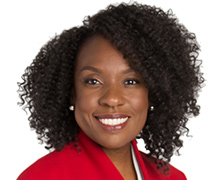Don’t Wait to Be Invited
Running for public office and putting your name on the line is a commitment that requires courage, support, and determination. Documentaries like Knock down the House, and podcasts like No Second Chances, make it clear that women are no longer waiting for doors to be opened—we’re forcing them open ourselves. History does not define us, and now more than ever, diverse representation is what we need in order to make strong, inventive policy decisions that serve the most vulnerable populations.
Before running for office, I encountered many individuals from the public and private sectors—many of whom became my mentors. They believed in me, inspired me, and supported me personally and professionally. Working with these mentors, and working with the government in a collaborative way, made me realize that being at the table often makes the biggest difference. You can lead from behind and you can lead from beside. But sometimes you have to lead from out front. And so, six years ago, I decided to run for public office.
More women involved in politics leads to more informed transformational policymaking. It is the job of elected representatives to engage in dynamic change-making, shift cultural norms, and ensure that the door is opened for the diverse populations we claim to represent.
Norms shift when those in power take bold action towards equality, and when marginalized groups hold seats at the decision-making table.
Greater female political participation results in increased responsiveness to citizen needs, improved collaboration across ethnic lines, and a more equitable future. These tangible gains impact us all by creating a space where all voices are heard.
Policy changes that advance equality are not just beneficial for women. For example, equal parental leave in workplaces means that both men and women are able to share childcare responsibilities, and that men are able to spend more time at home with their families. Equal opportunity policymaking offers greater flexibility for all genders.
We have a responsibility to create a world in which women from all backgrounds are able to thrive and reach their full potential. I am proud to be a woman of color in politics and hopeful that I will see governments across the country move closer to accurately reflecting the diversity of the amazing people and communities we represent. Now, more than ever, women must enter the political space—even when they are not invited.







